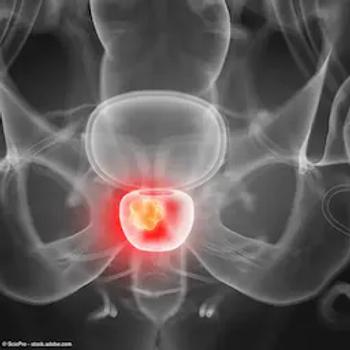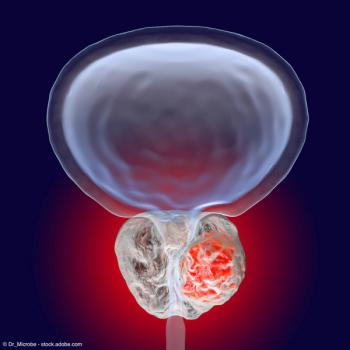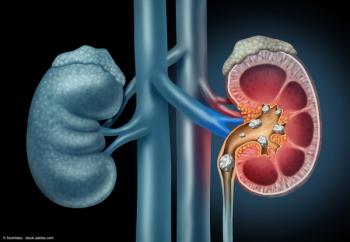
The investigators reported a significant improvement in IPSS, from 21.9 at baseline to 12.6 at 4 years.

The investigators reported a significant improvement in IPSS, from 21.9 at baseline to 12.6 at 4 years.

“Initiating oral TU therapy with Kyzatrex at 400 mg BID is safe and effective in achieving therapeutic serum testosterone levels," wrote the authors.

Overall, 4 of 5 patients with low-grade disease who received bel-sar with light activation achieved a complete clinical response.

The investigators found that only 2 (1.4%) urology programs and 12 (5.3%) OB/GYN programs included female sexual dysfunction content.

“In the absence of infection, [drain and retain] is a safe strategy without further complications compared to the primary groups," said Thairo Pereira, MD.

“Before and after implant, we noted a statistically significant increase in both the length and the girth,” said Peter J. Arnold, MD.

At 5 years, 95.8% of patients in the SBRT arm were free from biochemical or clinical failure compared with 94.6% of patients in the control radiotherapy arm.

Data from the EMPIRE-2 trial also showed that 18F-fluciclovine resulted in significantly more boosts to the prostate bed.

The target action date for the application is June 13, 2025.

"This first paper was really to show that our research methodology was feasible and acceptable with pediatric urology patients and families. We've done that, and now we have a huge corpus of data that we can further analyze through empirical studies," says Francesca A. Williamson, PhD.

Overall, 15/16 patients had a true positive scan based on confirmatory imaging and/or biopsy, equating to a PPV of 93.75%.

According to iota Biosciences, the device is “designed to deliver electrical stimulation directly to the bladder wall, inducing contractions that facilitate bladder emptying in individuals impacted by underactive bladder.”

The application is supported by data from the pivotal phase 3 ARANOTE trial.

Patient recruitment for the phase 3 AMPLIFY trial is set to begin early next year.

Both 177Lu-PSMA-I&T and 64Cu-PSMA-I&T are currently in phase 3 development for use in prostate cancer diagnostics and treatment.

"My hope is that the results of our study improve the uptake of active surveillance, further reducing unnecessary treatments, and this, combined with the improving reflex tests, may change the risk-benefit of PSA screening," says Lisa F. Newcomb, PhD.

“Nivolumab, combined with standard of care trimodality therapy, appears to be promising for the treatment of grade group 5 prostate cancer," says John Michael Bryant, MD.

"On-going innovation will continue to drive UTUC management forward, and with it will come on-going challenges of how to best study a relatively rare disease," write the authors.

"The biomarker is better at predicting presence of disease than absence, and the reason that that's important is that's how we can think about the biomarker aiding in careful clinical assessment of patients," says Elizabeth R. Plimack, MD, MS, FASCO.

"The TALAPRO-2 results provide much-needed hope to patients who remain in high unmet need for effective treatment options," said Neeraj Agarwal, MD, FASCO.

Tang discusses the limitations in available data, but nonetheless high potential, of SBRT in kidney cancer.

"If the documentation supported the use of modifier –22, it should be appended," write Jonathan Rubenstein, MD, and Mark Painter.

"We found that as soon as we got to the range of biochemical recurrence-defined PSA—0.2 ng/mL and up—the detection rate was very high," says Bridget Koontz, MD, FASTRO.

“While there are other treatment options available for treating BPH, there remains a significant need for much less invasive treatment approaches that can preserve and protect the integrity of the urethra and other critical structures," says Ryan Rhodes.

"Overall, TAR-200 is being tested with the aim of changing the therapeutic paradigm of patients with an early bladder cancer diagnosis, including non–muscle-invasive disease and muscle-invasive disease," says Andrea Necchi, MD.

"We remain on track for the opening of phase 2 in the next few months. We also expect to see the full phase 1 results presented at a scientific meeting in 2025," says David E. Gauden, DPhil.

Data from the phase 3 BART trial shows adjuvant radiotherapy is notably safe for patients with MIBC following radical cystectomy and chemotherapy.

Patients with elevated CTC count at baseline experienced poor complete response rates and worsened PFS and OS.

The WATER IV PCa will assess Aquablation vs radical prostatectomy in patients with grade group 1 to 3 localized prostate cancer.

"Aquablation is versatile. It can manage a very wide range of prostate sizes and shapes," says Stephen Overholser, MD.